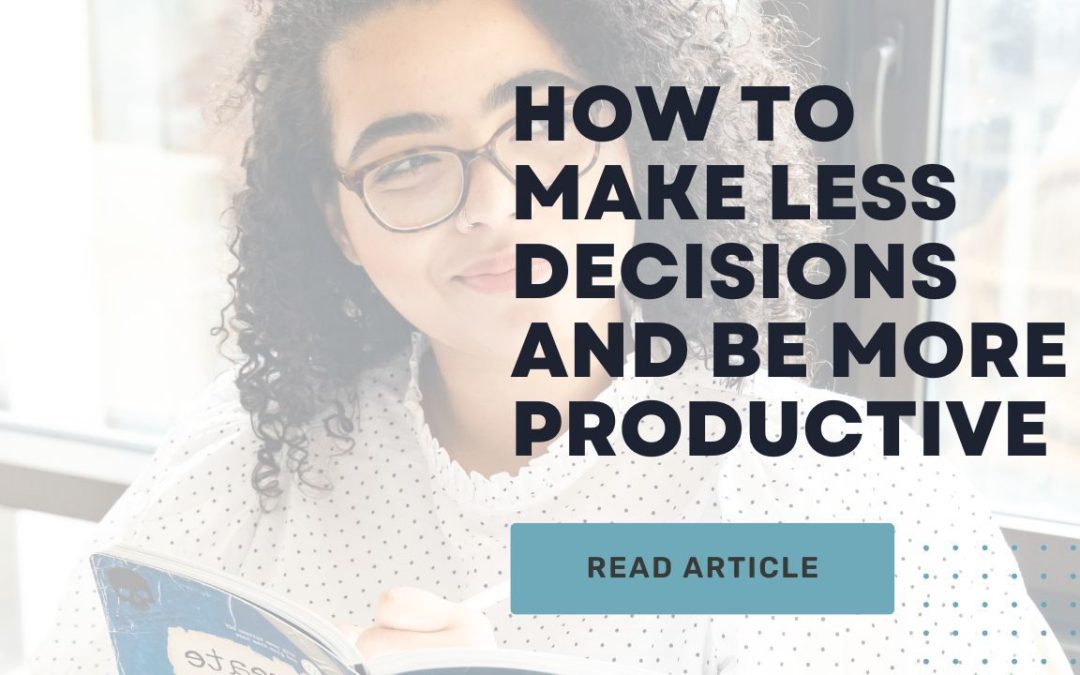The average person makes 35,000 conscious decisions per day (give or take depending on which research you read).
Getting this number down will help you be far more productive.
You can do this by offloading some of your current decisions and avoid taking more on.
Let me share a recent personal example of offloading a daily decision. As a business owner with many demands on your time, clearing any decisions (whether it be personal or business-related) from your plate will help you put more energy into what matters.
I’m a very average cook. I just don’t like it. To me, it gives very little ROI, takes ages to prepare, and only minutes to enjoy!
Until recently at about 4 pm every day I’d think oh, err what’s in the fridge? What can I give the kids to eat tonight? And then I’d scramble something together to eat.
Then I decided to put a task up on a freelancer site (Airtasker) for somebody to create a meal plan and shopping list for me with the dietary preferences we have. I wanted to see at the beginning of each week what I needed to shop for and have a healthy paint-by-numbers recipe to follow for each meal.
Job done, for about $200, a lovely lady created this for me. This has removed this unwanted daily decision-making from my plate, and I can use that time to relax or do something else.
What are some everyday decisions you can offload or avoid altogether? Apparently, Barrack Obama wears the same black briefs each day to remove that decision from his life. Maybe that’s a place to start!
Ok, back to business. Here’s a way you can identify what decisions you can offload/avoid.
Just imagine, you have jetted off on a wonderful vacation; your first in a while and have been on the plane for quite a few hours. You arrive in paradise, dream about ordering your first cocktail, and then reluctantly turn your phone on to see what problems have unfolded since you left.
What are they likely to be?
- Issues with a client negotiation
- Help run one of your roles
- Passwords
- The printer isn’t working, what do we do? (Seems trivial but I used to get this one a lot)
- Slow internet
- Information for a client meeting
- Etc….it doesn’t matter whether the problem is big or small, every time somebody hands you a decision to make and more importantly you choose to take it on, that’s more on your plate – not less!
What can you do?
- Set the boundaries and avoid saying as you are walking out the door “Call me if there are any problems” No, that will delay that first…and the second cocktail by way too long. And, you will be expecting calls (whether it’s a holiday or just leaving the office through the day).
- Get clear with your team about what warrants contacting you and what decisions they can make without you.
- Have a useful and practical SOP (standard operating procedures manual), online ideally (we used to call it the pink bible – it was that important…. and well, pink!) with access to passwords, suppliers, access codes, etc and make sure they know where that is and are encouraged to look there first. (You can give access without sharing the passwords themselves – that’s a post for another day but check out LastPass)
- Have them ask themselves the question “Who else could help me with this?” If it’s easy to just ask you – they will. A good tip here is to team newbies up with a buddy.
- Ask them to only contact you if they have thought about potential solutions. In many cases, this may stop them from asking you as they figure it out themselves. Or, if they still call you, they may have already provided the solution.
- Use it as an opportunity to empower them and know you trust their decisions. (And if they make a bad one, so be it)
- The same applies to when you are in the office.
- If you are getting asked the same questions repeatedly make sure the answer is in your process manual and direct them there.
A quick note on emails
If somebody emailed me about an issue and I got straight back to them, I realised I was training them to contact me every time there was an issue they couldn’t resolve at first blush.
Then I realised, the longer I took to reply or push back to them to make a decision (unless of course it was urgent and they really did need my help) the more likely they would resolve it themselves and try to do so the next time.
If you make yourself overly available to people, they will load more and more decisions onto your plate. This is contrary to best practice CEO behaviour😊
It can make us feel important in helping people make decisions, but the more we do it the more they will expect it.
Use the above to help you identify decisions you can offload and ways to stop people from unloading more of them on you so next time you step off that plane you can go straight to the cocktail lounge and enjoy your well-earned break.
Hope this helps.
BK


Get TRACTION
Great TIPS & ADVICE straight to your INBOX.
Let's make it happen!
We'll share PROVEN GROWTH STRATEGIES to help you get more money, more freedom and more control.
Success - Thank you for Subscribing to TRACTION.